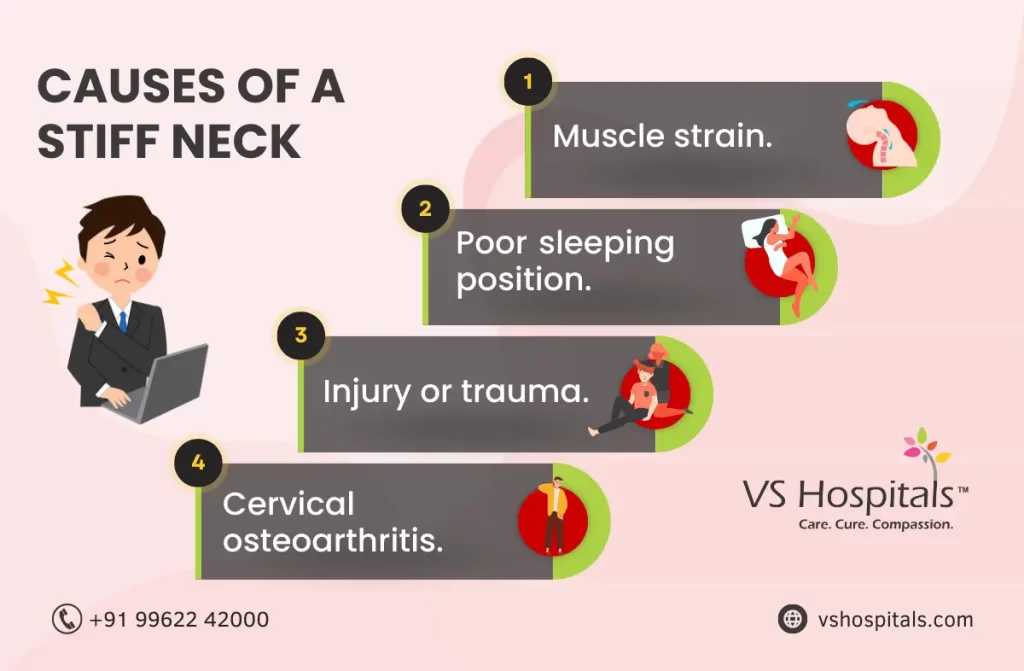Have you ever woken up with a neck so painful you can’t even move it to look to the side? Ever worked for long periods of time that you noticed your neck muscles already stiffening up due to stress and strain? You may already be manifesting signs of having a stiff neck that requires neck pain treatment in Chennai.
Thanks to our extremely fast-paced and bustling lifestyles paired with lack of rest and poor body posture, stick necks have become pretty normal. But if it persists for a longer time than the usual two to three days recuperation window, then it could be a manifestation or warning to get the best treatment for stiff neck.
What is Neck Pain?
The neck is composed of vertebrae that extend from the skull down to the upper torso. Cervical discs absorb shock between these bones, while the supporting bones, ligaments, and muscles facilitate head motion and support. Inflammation, abnormalities, or injuries can lead to neck pain and stiffness.
Occasional neck pain and stiffness often result from poor posture, overuse, or injuries from falls, sports, or whiplash. Mild neck pain typically resolves in a few days, but persistent symptoms lasting more than a week require immediate medical attention.
Understanding Stiff Necks
Stiff neck pain, known as a cervical spasm in clinical terms, is commonly caused by sore neck muscles. While it is usually not a cause for alarm, it is important to recognize that a stiff neck can sometimes be a symptom of an undiagnosed medical condition. Being mindful of this possibility, it is advisable to seek medical evaluation if the stiff neck persists or is accompanied by other concerning symptoms. Getting the best neck pain treatment in Chennai can help identify and address any underlying issues, ensuring appropriate treatment and relief.

Causes of Stiff Necks
Like what was mentioned above, a stiff neck can develop from poor body posture or because of too much stress, however, there are other stiff neck causes and treatments that can cause a stiff neck or cervical spasm:
- Trauma or Injury: Injuries of concussions to the head and neck may cause the neck muscles to spasm and start to stiffen and hurt. This ensures you get the best treatment for stiff neck.
- Underlying Medical Conditions: High blood pressure and Meningitis are two of the most common health complications that are manifested by having painful, tensed, and stiff necks. Brain inflammation can also cause stiff necks paired with vomiting and nausea requiring stiff neck pain treatment.
Symptoms of Stiff Necks
A stiff neck is a common condition characterized by discomfort or pain when you try to move your neck, and it typically results from muscle strain, tension, or injury. Symptoms of a stiff neck can vary in intensity and duration, but they often include:
- Neck Pain: The primary symptom of a stiff neck is pain, which can range from mild to severe. The pain is typically localized to the neck area and may worsen when you attempt to move your neck.
- Limited Range of Motion: A stiff neck often leads to difficulty in moving your neck in various directions. You may find it challenging to turn your head from side to side or to tilt it forward or backward.
- Muscle Tension and Tightness: You may experience muscle tightness and tension in the neck and upper shoulder region. This can contribute to the stiffness and discomfort.
- Pain When Touching or Pressing: The neck muscles may be tender to the touch, and pressing on them can cause discomfort or exacerbate the pain.
- Headache: In some cases, a stiff neck can lead to tension headaches, which typically manifest as a dull, aching pain that radiates from the neck into the head.
Diagnosis of Neck Pain Treatment in Chennai
To diagnose the stiff neck causes and treatment, healthcare professionals typically begin with a thorough physical examination and medical history assessment. They will inquire about the symptoms, their duration, and any potential triggers or underlying conditions. The examination may include assessing a range of motion, muscle tenderness, and looking for signs of inflammation or injury.
In some cases, additional diagnostic tests may be recommended for the best neck pain treatment in Chennai to rule out underlying medical conditions or injuries. These tests can include imaging studies such as X-rays, CT scans, or MRI scans to evaluate the bones, joints, and soft tissues of the neck.
Treatment for Neck Pain
For effective neck pain treatment in Chennai, a thorough medical examination is essential. Doctors need to be aware of all over-the-counter medications the patient is taking and any accidents or injuries, even if they seem unrelated. Treatment is based on the diagnosis, which may involve several diagnostic tests and treatment options.
Diagnostic Tests:
- Blood tests
- X-rays
- CT scans
- MRI scans
- Electromyography
- Lumbar puncture
Treatment Options:
- Heat and ice therapy
- Exercise, stretching, and physical therapy
- Pain medication
- Corticosteroid injections
- Muscle relaxants
- Neck collar
- Traction
- Antibiotics
- Surgery
Alternative Therapies:
- Acupuncture
- Chiropractic treatment
- Massage
- TENS (transcutaneous electrical nerve stimulation)
Comprehensive neck pain treatment in Chennai ensures that patients receive personalized care tailored to their specific condition, enhancing their recovery and quality of life.
Types of neck pain
Neck pain can be caused by a number of different things, resulting in different types of discomfort. Common types of neck pain include
- Muscle strain: Caused by overuse or poor posture.
- Cervical spondylosis: Age-related wear and tear of spinal discs and joints.
- Herniated disc: Disc material pressing on nerves.
- Whiplash: Sudden back-and-forth movement, often caused by a car accident.
- Cervical radiculopathy: Nerve compression in the neck.
- Tension headache: Muscle tension that causes head and neck pain.
- Cervical stenosis: Narrowing of the spinal canal.
Identifying the specific type helps to target treatment. Consultation with a healthcare professional is recommended for accurate diagnosis and appropriate treatment.
Tips to Prevent Recurring Stiff Necks
Nobody wants to bear the discomfort of a stiff neck, not only is it difficult to move around, but it also makes concentrating more difficult as the pain will always distract you. Here are some helpful tips to avoid neck pain treatment in Chennai.
- Avoid Too Much Stress: Too much physical and emotional stress can cause strain on the neck muscles which can eventually lead to a stiff neck pain treatment.
- Check the Bed and the Pillow: Make sure that your head is ergonomically situated on the pillow and that the bed is leveled just right so that it supports your entire body and it does not put any strain on your neck and upper body.
- Perform Isotonic Exercise: Isotonic exercises are aimed at strengthening the neck and back muscles. Having a strong neck and back muscle diminishes the chances of having a stiff neck causes and treatment.
- Avoid Prolonged Static Positions: Avoid sitting or standing in one position for too long. Take regular breaks to move and stretch, especially if your work requires repetitive neck movements.
- Use Proper Lifting Techniques: When lifting heavy objects, use your legs and not just your neck and back muscles. Bend your knees, keep the object close to your body, and avoid twisting or jerking motions.
Home Remedies to Treat Neck Pain
- Apply Ice or Heat: Using ice packs or heating pads can effectively reduce inflammation and soothe sore muscles. Initially, apply ice for the first 48 hours after the pain begins, then switch to heat.
- Gentle Stretching: Perform gentle neck stretches and range-of-motion exercises to improve flexibility and reduce stiffness.
- Over-the-Counter Pain Relievers: Medications such as ibuprofen or acetaminophen can help alleviate pain and reduce inflammation.
- Good Posture: Maintain good posture while sitting, standing, and sleeping to avoid additional strain on the neck muscles.
- Massage: Gently massaging the neck muscles can relax tightness and enhance blood circulation.
- Stay Hydrated: Drinking plenty of water helps maintain spinal health and prevent stiffness.
- Use Supportive Pillows: Ensure you use a supportive pillow that keeps your neck in a neutral position while sleeping.
When to Consult a Doctor for Neck Pain
- Severe Pain: If the neck pain is severe and does not improve with home remedies, seek medical attention.
- Radiating Pain: If the pain radiates down the arms or legs, it may indicate a more serious condition that requires professional evaluation.
- Numbness or Weakness: Experiencing numbness, tingling, or weakness in the arms or legs necessitates immediate medical attention.
- Persistent Pain: Neck pain that persists for more than a few days without improvement should be assessed by a healthcare provider.
- Associated Symptoms: If the neck pain is accompanied by other symptoms such as fever, headache, or unexplained weight loss, consult a doctor.
- Injury or Trauma: Seek immediate medical help if the neck pain follows an injury or accident.
- Difficulty Swallowing or Breathing: Difficulty swallowing or breathing alongside neck pain can indicate a serious underlying condition that needs prompt medical evaluation.
Conclusion
To conclude, it is essential to understand the symptoms and potential causes of a stiff neck to determine the appropriate stiff neck pain treatment. Most cases can be managed with self-care measures such as rest, applying heat or cold packs, gentle stretching exercises, and over-the-counter pain relievers. However, persistent or severe symptoms can lead to getting the best neck pain treatment in Chennai to rule out more serious conditions.
Read also Best Physiotherapist in Chennai.




